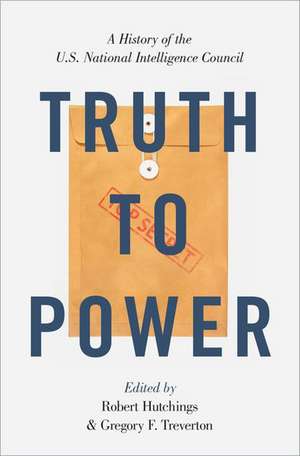Truth to Power: A History of the U.S. National Intelligence Council
Editat de Robert Hutchings, Gregory F. Trevertonen Limba Engleză Paperback – 27 iun 2019
| Toate formatele și edițiile | Preț | Express |
|---|---|---|
| Paperback (1) | 265.81 lei 31-37 zile | |
| Oxford University Press – 27 iun 2019 | 265.81 lei 31-37 zile | |
| Hardback (1) | 586.70 lei 31-37 zile | |
| Oxford University Press – 27 iun 2019 | 586.70 lei 31-37 zile |
Preț: 265.81 lei
Preț vechi: 314.23 lei
-15% Nou
Puncte Express: 399
Preț estimativ în valută:
50.86€ • 53.24$ • 42.33£
50.86€ • 53.24$ • 42.33£
Carte tipărită la comandă
Livrare economică 20-26 martie
Preluare comenzi: 021 569.72.76
Specificații
ISBN-13: 9780190940010
ISBN-10: 0190940018
Pagini: 256
Dimensiuni: 241 x 155 x 13 mm
Greutate: 0.36 kg
Editura: Oxford University Press
Colecția OUP USA
Locul publicării:New York, United States
ISBN-10: 0190940018
Pagini: 256
Dimensiuni: 241 x 155 x 13 mm
Greutate: 0.36 kg
Editura: Oxford University Press
Colecția OUP USA
Locul publicării:New York, United States
Recenzii
Hutchings and Treverton's volume offers valuable perspectives on the analytical work of the NIC in three decades of global transition, which shows the lasting importance of future-oriented strategic analysis.
Notă biografică
Robert Hutchings is the Walt and Elspeth Rostow Chair in National Security and Professor of Public Affairs at the Lyndon B. Johnson School of Public Affairs at the University of Texas at Austin, and served as Dean of the LBJ School from 2010 to 2015. Before coming to UT, he was Diplomat in Residence at Princeton University, where he had also served as Assistant Dean of the Woodrow Wilson School of Public and International Affairs. During a public service leave from Princeton in 2003-05, he was Chairman of the National Intelligence Council in Washington, D.C. His combined academic and diplomatic career has included service as Fellow and Director of International Studies at the Woodrow Wilson International Center for Scholars, Director for European Affairs with the National Security Council, and Special Adviser to the Secretary of State, with the rank of ambassador.He is author or editor of four books, including American Diplomacy and the End of the Cold War and, with Jeremi Suri, Foreign Policy Breakthroughs: Cases in Successful Diplomacy.Gregory F. Treverton is Professor of the Practice of International Relations and Spatial Sciences at the USC Dornsife College of Letters, Arts and Sciences and Visiting Fellow at the Center for Asymmetric Threat Studies, Swedish National Defense University. He served as chairman of the National Intelligence Council from 2014 to 2017. Earlier, he directed the RAND Corporation's Center for Global Risk and Security, and before that its Intelligence Policy Center and its International Security and Defense Policy Center, and he was associate dean of the Pardee RAND Graduate School.He has served in government for the first Senate Select Committee on Intelligence, handling Europe for the National Security Council and as vice chair of the National Intelligence Council, overseeing the writing of America's National Intelligence Estimates (NIEs). He has taught at Harvard and Columbia universities, in addition to RAND, been a Senior Fellow at the Council on Foreign Relations, and Deputy Director of the International Institute for Strategic Studies in London. His latest books are Dividing Divided States and, with Wilhelm Agrell, Beyond the Great Divide: Relevance and Uncertainty in National Intelligence and Science for Policy (Oxford).
